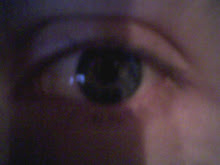* * * * *
I I
* * * * *
Miles sat alone in his house. His house was cold, sparsely decorated, but clean. On his good days Miles was a talented carpenter and mechanic; he had built the ornate bookshelf and had repaired the furniture he found at the second-hand store. On his good days he was very good with his hands. The house had nearly fallen apart when Miles purchased it. Work helped him focus, helped keep the voice at bay and the feelings of fear at a low roar. On his good days he didn’t need to drink, didn’t have the headaches or the gnawing paranoia.
There hadn’t been many good days of late.
Miles sat alone in his house, lost in his thoughts, awash amidst the waves of regret, feelings of loss and emptiness. He saw her eyes, beautiful brown eyes, looking him over as she sat next to him at the pub. He saw them glaze over and roll back in her head; he saw her face relax, her features fall, like a marionette whose strings had just been cut. He saw blood slowly drip across her face, across her beautiful brown eyes, but she didn’t notice, she didn’t respond, she didn’t move.
His eyes fell on the bookshelf across the room; every book was neatly shelved save one. He crossed the room and he saw the book, the battered cover, the well-read pages of the Holy Bible. This belonged to his mother; she had sent it with him the last time they spoke. He didn’t remember pulling it out – he felt he should remember – but everything recently was a haze, a painfully disorienting gray. He reached out, picked up the bible and returned it to the shelf. It hurt him to touch it, it burned his hand and he felt the memories bubbling up in the back of his head. She revered the book, feared the book, loved the book with awe and wonder and terror. The momentary touch of her bible took him back to that place – that place he did not want to go – that place in the hospital, and the last time he saw his mother.
She left it with him, as if leaving a part of herself, as if leaving the book would leave him in the hands of God and He would somehow help heal Miles, somehow help ease the pain and quiet the trembling voice. She left him, then, and Miles knew it was the last he would see her, he somehow knew as a terrified fifteen-year-old boy, that his mother would not come back.
He shook his head, clearing it of the memory. The right side of his head hurt; sobriety brought him acute awareness to the aches and twinges of his body. The cut on his head was still tender, and a purple welt had swollen on his cheek where the man had struck him. Scratches on his arms burned as well, like acid under his skin, but they were a point of focus, an accumulation of pain. These wounds drew his attention from the book, and he shook his head, dazed. He slid the book back onto the shelf without a sound, his eyes wide open and his face perfectly still. His skin cooled, his mouth went dry, and the voice was momentarily still, like the electric calm before a breaking storm. His lip quivered a moment, a cascade of memories balanced precariously, waiting to collapse upon him.
Miles walked silently into the kitchen, turned on the sink and splashed cold water on his face. It was dark outside, and he could see his reflection in the kitchen window. His pale eyes glowed, his heavy brow furrowed and his cheeks looked sunken and hollow. His dark hair was greasy and matted against his head. His dark shirt brought contrast to his pale skin; he looked ashen, almost skeletal against the dark backdrop.
He pulled a small box from atop the refrigerator. He brought the box to the kitchen table and sat, the box in front of him. The voice was a low drone, more sounds than any discernible words. He withdrew a razor blade from the box and stared at it for a long time. He set the razor down and stripped off his shirt. Across his left right shoulder and down his back was a deep burn; something long ago had torn across his back, searing flesh and leaving battered and tortured skin in its wake. Across his left arm were scars, a dozen precise horizontal wounds cut across his bicep. He picked up the razor and drew a line across his arm just below the last wound. Miles closed his eyes, the pain was deep and sharp and he winced momentarily, and then the pain took him. Blood welled up on his arm, and Miles focused on the ritual; he buried himself in the pain, escaped into the pain. The voice was quiet; the voice could not overtake the deep and satisfying sting that started in his arm and flooded through him. He dug the blade in deep, deeper into his arm until he could feel nothing else. The blade enveloped him, encompassed him, embodied him, became him. Tears sprung up in his eyes, and he disappeared.
